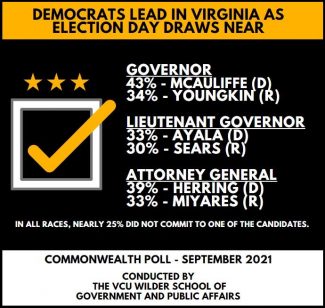Virginia Gov. Ralph Northam said that hospital workers in the state are “losing their patience” and that medical facilities will not be able to handle all patients with COVID-19 or other ailments if hospitals are understaffed beyond where they are now.
“They need our help,” he said Monday at a news conference. “It’s getting to the point where we worry about nurses and technicians and custodians — they’re at the point where they can’t take it anymore. We don’t want to get to that point, where there’s not enough staff, there aren’t enough [staffed] beds.”
According to the Virginia Hospital & Healthcare Association, Virginia is in the midst of a fourth surge of the coronavirus with the second-highest spike, after the height reached just after the holidays, when total daily hospitalizations exceeded 3,200. Thursday’s COVID hospitalization number was 2,068.
“In addition to the current surge, many Virginia hospitals are experiencing a growing demand for emergency department care (including for non-COVID medical needs) [and] several Virginia hospitals are providing medical care to Afghan refugees who are being resettled in the U.S.,” said Julian Walker, VHHA’s vice president of communications. “Some patients who delayed medical care during the pandemic are now seeking hospital-based care, and [there’s a] growing demand for behavioral health treatment services. Each of these conditions continue to place strain on our hospitals and the dedicated caregivers on their teams across Virginia who have bravely battled this pandemic for more than 18 months. During this period, demand for supplemental health care staff and travel nurses has significantly increased, as has competition for those professionals.”
The governor also noted that staffing is a problem for many school systems — particularly substitute and full time teachers and bus drivers — although the state legislature has put aside $11.5 million to pay bonuses to attract more school employees.
Northam spoke bluntly regarding adults who have not gotten vaccinated, totaling about 20% of the 18-and-above population in Virginia. He appealed to their sense of family connection and specifically what their spouses and children would do if they died.
“I want to give you two facts: These vaccines are incredibly safe and effective,” he said. “We have the data from millions of people around the world. Two, by choosing not to get vaccinated, you are absolutely hurting other people. You are costing everyone a lot of money — $5 billion in costs to treat a disease that could be avoided with a free vaccine.”
He also explained the process of intubation, which allows the most serious COVID patients to receive oxygen and often is a last-ditch effort to save lives. “They put a tube just about the size of a garden hose down your throat to keep you alive,” Northam said. “It is miserable, it is expensive. Give some thought to what your family will do without you. You’re taking a foolish, dangerous chance, and it affects many more people than just you.”
According to the governor, the 200,000-plus state employees who are required to either be vaccinated or present proof weekly of a negative COVID test are vaccinated at a rate of about 75% to 80%, similar to the general adult population. He said that he did not plan to change the policy that allows workers to be tested instead of getting the vaccine.
With 80.1% of Virginia adults having received at least one dose of a COVID vaccine and 60% fully vaccinated, the state is ranked No. 14 in the country for per capita vaccination rates and has the highest rate in the South, Northam said. However, he noted, rates differ widely by region, with far more people in Northern Virginia having been vaccinated compared to rural areas. He encouraged political officials and community leaders in under-vaccinated areas to encourage people to get their shots, saying that some have not done enough outreach.
Northam also said that he expects federal officials to approve shots for children ages 5 to 12 in six weeks or perhaps a bit longer, at which time school systems will begin providing vaccines with cooperation from local health departments.
He noted that Pfizer booster shots are now available at pharmacies, health departments and doctors’ offices for people who are immunocompromised, over age 65 or are frontline workers who received their second shots at least six months ago. For more information on locations that offer booster shots, visit vaccinate.virginia.gov.



 The poll of 811 adults in Virginia was conducted Sept. 7-15 with a margin of error of 5.35%, which increases to 6.93% when considering likely voters only. In the attorney general race, incumbent Herring has a six-point lead over Republican Miyares, 39% to 33%, and Ayala appears to have lost ground against Sears, with a 33% to 30% lead that falls within the margin of error. However, 20% of voters said they remain undecided or unwilling to
The poll of 811 adults in Virginia was conducted Sept. 7-15 with a margin of error of 5.35%, which increases to 6.93% when considering likely voters only. In the attorney general race, incumbent Herring has a six-point lead over Republican Miyares, 39% to 33%, and Ayala appears to have lost ground against Sears, with a 33% to 30% lead that falls within the margin of error. However, 20% of voters said they remain undecided or unwilling to